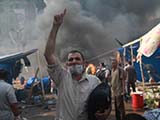Egypt's Protest Law: The Interim Government and the Fabrication of Problems
18 Dec 2013
By Nader Bakkar for Atlantic Council
While the Nour Party represented the second largest bloc in the Shura Council, it was critical of the council’s inability to fulfill its basic role. It was also critical of the manner in which it issued one law after the other, as if in a race against time, the deadline looming set by the next round of elections. It is true that conditions at the time were exceptional due to the Supreme Council of the Armed Forces’ dissolution of the first post-revolution parliament and the transfer of legislative power to the presidency. However, legislative power should have been benched and should not have been used except when absolutely necessary, until a new parliament was elected. The odd irony, however, is that the interim government is repeating the same mistakes that its predecessor made, and in an even more provocative manner.
The precariousness of the current cabinet’s position as a temporary and unelected government is worth noting. This is contrary to the Shura Council’s status as an expression—albeit a limited one—of the will of the electorate. If the need for a law is pressing—as is now the case for organizing protests—the interim government has no choice but to open a real socio-political dialogue, acknowledging different points of view. Only then can it either work according to these recommendations, or present logical justifications for its refusal. At the very least, this process would achieve some degree of political consensus on the law, allowing it be applied in the midst of Egypt’s tumultuous state.
The main cause for fear is not just that we are witnessing a repeat of the Muslim Brotherhood’s strategic mistake of monopolizing legislative and executive power, but also the worrisome provisions of the protest law itself. Most troubling are the penalties for violators who could face up to five years in prison. There is no doubt that the anger of many Egyptians and the protests that have raged on for three months can be seen as a pretext for passing many of the law’s provisions. There should be deterrents for those who spark riots, groups of thugs, or anyone damaging public and private buildings. However, strict implementation of the existing penal code is sufficient to stop all those who might breach it. Violent crimes, vandalism and the destruction of public property should be criminalized, whether or not they occur during a demonstration.
There are also justified concerns surrounding the misuse of the law. On one hand, there is the less than reassuring history of the security apparatuses charged with dealing with violators. The law in no way addresses anticipated human rights violations while dealing with demonstrations. It also does not provide for any penalty against police officers who use excessive force against or kill demonstrators. On the other hand, many fear that the law may be a step towards the return of the security apparatus’ control of politics by oppressing demonstrations and using weak pretenses to bar political groups from gathering, as was the case under ousted president Hosni Mubarak. Moreover, slow moving litigation procedures were no solution in cases of abuse or misuse of the law.
The Protest Law, which fully criminalizes demonstrators’ use of sit-ins, flying in the face of the international laws that protect this right, is not the first law that Prime Minister Hazem El-Beblawy’s government has been insistent on passing, and it will certainly not be the last. Beblawy previously spoke of several laws, the most surprising of which was the draft known in the media as the ‘good intentions’ law. This ill-considered government proposal would offer immunity to senior state officials, provided that their actions were completed “with no criminal intent.” This would obstruct the process of holding senior officials accountable, and offer refuge to corrupt financial tycoons under the cover of their ambiguous ‘good intentions’ instead of fixing the foundations of governance and searching for ways to confront conflicts of interest.
The right to peaceful protest is one of the most important gains of the revolution, and is now threatened by a law that restricts protests instead of organizing and legalizing them. Bebalwy’s government seems persistent on committing the same fatal mistakes made by Qandil’s government. In both cases, these mistakes contributed to a growing hostility against their governments with each passing day. The interim government insisted on approving a protest law, ignoring its rejection by political parties and youth, all of whom spoke out before its enforcement. It has created an even more hostile environment with the revolutionary powers, university students, and anyone who feels that the right to protest has come under threat—all the more so after witnessing how security forces dealt with the first post-protest law demonstration. If the government wants to avoid the inevitable fallout from enforcing the law, there is no alternative except to refer it back to a political and social dialogue. Otherwise, the list of the government’s enemies is only bound to grow.
Nader Bakkar is a co-founder of Egypt’s al-Nour Party and serves as a member of the party’s presidential and foreign affairs committees, as well as the chairman’s assistant for media affairs.
For additional reading on this topic please see:
Reforming the Muslim Brotherhood
Egypt: A Political Road Map
Islamist or Nationalist: Who is Egypt's Mysterious New Pharaoh?
Egypt: On the Road to Disaster

